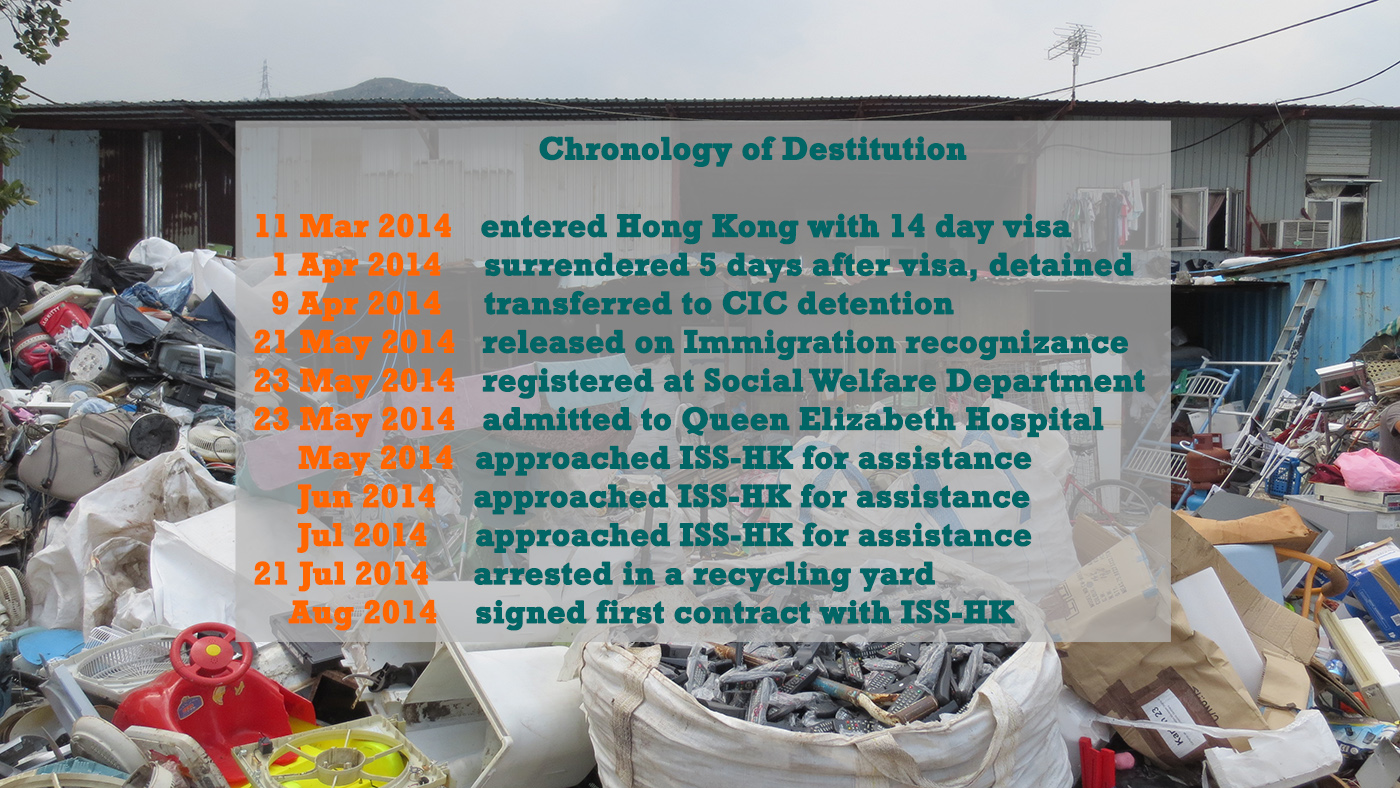
Called to the stand in Shatin Magistracy, Mohammed faced charges of breaching conditions of stay by taking up employment unlawfully. With the assistance of a Hindi interpreter, the despairing 50 year-old listened carefully before entering a plea – NOT GUILTY!
Asylum seekers are most commonly tarred with one brush. Public opinion is almost unanimous in accusing them of beating a path to our city to fraudulently drink in its riches by abusing welfare assistance, or toiling in the underground economy. Obfuscating the truth, the authorities regularly promote to the inattentive a rejection rate of 99.9% as evidence that only 1 in 1000 claims is meritorious.
The government remains unyielding and is adamant that the asylum mechanism offers genuine claimants a fair chance. No explanation is given about cases that have been pending for years often stretching to a decade. At the other end of the spectrum are recent arrivals who presumably didn’t expect to suffer like beggars after lodging protection claims with the Hong Kong Government.
Everything was better in Mohammed’s life before he took refuge in our city. If he didn’t face danger, he wouldn’t have left behind a supportive wife and adult children, abandoning a comfortable home and a thriving family business. At half a century of age, he hardly fits the stereotype of an adventurer seeking a better life in a developed country where illegal work might support remittances home.
One night, a few months after being released from Immigration detention, Mohammed regained consciousness in a ward at Queen Elizabeth Hospital. “I didn’t know how I got there. I was feeling ill that morning as I hadn’t had anything to eat and I was exhausted by sleeping outside week after week. The nurse told me that I had hit my head when I collapsed in the street. An ambulance was called and I was admitted to hospital for three days until I recovered.”
Holding back tears, he finds it hard to continue, “Those were the only three days when I ate properly since I was released from CIC. The nurses gave me extra food to make me stronger. For several months before I only ate what shops donated to me in Chung King Mansions. It was never enough. I lost a lot of weight and was often sick. I was worried when discharged from hospital as I knew I would be hungry.”
Mohammed reported that he had registered at the Social Welfare Department and had been referred to ISS-HK, but nobody called him for months. He forgets how long it was because several months passed in a blur of destitution, begging for handouts, sleeping in the streets, falling sick and depressed and always struggling with hunger. As if life couldn’t get more distressing, it did.
One Ramadan afternoon before the Zuhr prayers, he was accosted by a faithful at the Kowloon mosque who, presumably noticing his grime state, inquired about his condition. Mohammed explained that he was a refugee and had long run out of money and support. The well-wisher showed concern and with the enticement of a ‘breaking fast meal’ invited him on a trip in a private car to a recycling yard in Lok Ma Chau. The arrangement did not raise the suspicions of a newcomer in an international city.
Beggars can’t be choosers and nothing seemed out of the ordinary for hungry Mohammed about Muslim faithful offering desperately needed support in the name of Zakat – charity being one of the five pillars of Islam and a special obligation during Ramadan. Nobody suspected that police commandos were concealed in nearby bushes cocking machine guns to raid the isolated yard.
Around 3:30pm, before Mohammed enjoyed a single morsel of food, armed police burst inside. In the ensuing chaos, the panic-stricken refugee dove inside a wrecked car hugging the rusty floor until he was dragged out by the collar of his jacket two hours later, sweaty and confused. The fact that he was hiding from enforcement agents was subsequently put forward as evidence of his guilt.
Mohammed stands accused of working illegally. The police took photos of those arrested after the raid, not when they were allegedly working. The threadbare clothes of a homeless existence were put forward as work clothes, though Mohammed had arrived an hour earlier and his hands were clean.
It is certainly possible that Mohammed is lying and had accepted an offer for work at a time of acute desperation. Perhaps Mohammed is afraid of admitting the truth for fear of being jailed for 15 months for working illegally. Perhaps it wasn’t the first time he went to that yard and the police had failed to take such photo. But he claims to be innocent. And this arrest consequently raises more questions than answers.
How much of a crime is it to steal bread when you are hungry? How are refugees expected to survive for weeks and months before receiving welfare? For that matter, refugees are trapped between inadequate assistance and cope without breaking the law. Is the government promoting “no welfare – no work” entrapment? In some jurisdiction offenders may be found innocent when authorities use deception to make arrests. Shouldn’t the courts take note of contextual evidence?


